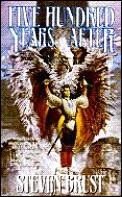
| Series: | Khaavren Romances #2 |
| Publisher: | Tor |
| Copyright: | April 1994 |
| Printing: | March 1995 |
| ISBN: | 0-8125-1522-6 |
| Format: | Mass market |
| Pages: | 553 |
This is the second book of the Khaavren Romances, following the same characters as The Phoenix Guards. However, it takes place, as the title indicates, five hundred years after the previous book; while you'd miss something by not being previously familiar with the characters, it is readable by itself. More useful for full enjoyment is to have already read the Vlad Taltos series, or part of it at least, so that you've been teased with mentions of world history and hence can enjoy the satisfaction of more finally being revealed.
At the start of Five Hundred Years After, Khaavren is still in the Imperial Guard and even has the same rank, but he's grown steady and laconic in his years of service. He seems like a different character at first, far more serious and adult, but when he starts his internal monologues one can see the core of the Khaavren from The Phoenix Guards. The story opens with the current troubles of the Empire and a string of mysterious assassinations, and from there turns into a story of conspiracy, investigation, and political conflict slowly spinning out of control. The four heroes from The Phoenix Guards are, of course, gathered before long so that they can meet the new challenge together.
Brust here moves the Khaavren Romances more into the center of the history of his universe. In The Phoenix Guards, there were only a few characters connected to the Vlad Taltos books, and those were almost all mentioned in passing. Adron himself was the only major connection. Five Hundred Years After tells a much less minor episode of history, however, and several of Vlad's later acquaintances take center stage. Sethra Lavode and Aliera, in particular, get quite a bit of time on stage (and have a wonderful dynamic). We also find out, much to the curiosity and satisfaction of long-time Vlad readers, how Mario got his start.
Despite the appearance of such legendary figures, Five Hundred Years After is in tone and style very similar to The Phoenix Guards. It's a light-hearted adventure most of the way, spiced with resonance with the rest of the Dragaeran universe and with serious Imperial consequences, but pursued in the manner of daring adventure. The four companions (and their close compatriots) are more mature, but largely conduct themselves the same as they did in the previous book. Paarfi's loquacious and intrusive narrative style produces an interesting distancing effect, making the reader constantly aware of the story as a story and providing a running commentary on how stories are told, which tends to reduce suspense and smooth sharp emotional tugs in exchange for a strong feel for the narrator and an occasional grin at a particularly sharp bit of commentary.
In this book, however, there are a few moments where something deeper and more powerful shines through the storytelling and digressive commentary. The most memorable moment of the book for me was the conversation between Tazendra and Sethra Lavode about the nature of the Dzur and about sword-sharpening. It's now the defining character moment for Sethra for me, and I think one of the best bits of writing Brust has done. That's the most serious of such moments, but there are a few others, such as Sethra's baiting of Aliera, or a few of Mario's later moments in the book. Paarfi, as narrator, also pulls off a surprisingly good climax given the difficulty of what's being described.
As with The Phoenix Guards, the framing is a good bit of the fun. The mock-interview between Brust and Paarfi isn't as interesting as the writer bios of the previous book, but it's still occasionally amusing. Better is the preface, which is a great bit of analysis of historical fiction, all the better for being set in an entirely fictional academic environment.
This series still doesn't grab me quite as much as the best of the Vlad books do, in part due to the distancing effect of the narration, but the style is strangely addictive and the history is becoming more interesting. Five Hundred Years After is getting closer to what I was expecting of this series: an opportunity to fill in the history that's mentioned so maddeningly allusively in the Vlad novels. This is a slightly better book than The Phoenix Guards, with the same fun tone but more depth and a few more memorable moments. If you liked the previous book, definitely read this one as well.
Followed by The Paths of the Dead.
Reviewed: 2008-10-28